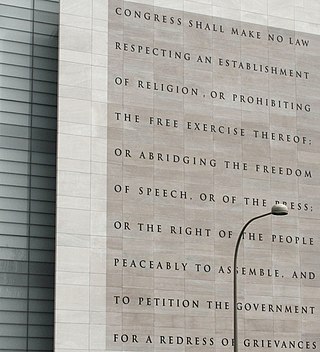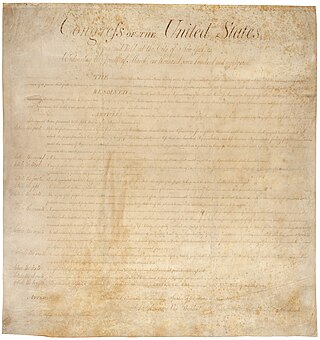Related Research Articles
Defamation is the act of communicating to a third party false statements about a person, place, or thing that results in damage to its reputation. It can be spoken (slander) or written (libel). It constitutes a tort or a crime. The legal definition of defamation and related acts as well as the ways they are dealt with can vary greatly between countries and jurisdictions.

The First Amendment to the United States Constitution prevents the government from making laws that regulate an establishment of religion, or that prohibit the free exercise of religion, or abridge the freedom of speech, the freedom of the press, the freedom of assembly, or the right to petition the government for redress of grievances. It was adopted on December 15, 1791, as one of the ten amendments that constitute the Bill of Rights.
Hustler Magazine, Inc. v. Falwell, 485 U.S. 46 (1988), is a landmark decision by the Supreme Court of the United States in which the Court held that parodies of public figures, even those intending to cause emotional distress, are protected by the First and Fourteenth Amendments to the U.S. Constitution.

Hill v Church of Scientology of Toronto February 20, 1995- July 20, 1995. 2 S.C.R. 1130 was a libel case against the Church of Scientology, in which the Supreme Court of Canada interpreted Ontario's libel law in relation to the Canadian Charter of Rights and Freedoms.
New York Times Co. v. Sullivan, 376 U.S. 254 (1964), was a landmark U.S. Supreme Court decision ruling that the First Amendment to the U.S. Constitution's freedom of speech protections limit the ability of American public officials to sue for defamation. The decision held that if a plaintiff in a defamation lawsuit is a public official or candidate for public office, not only must they prove the normal elements of defamation—publication of a false defamatory statement to a third party—they must also prove that the statement was made with "actual malice", meaning the defendant either knew the statement was false or recklessly disregarded whether it might be false. New York Times Co. v. Sullivan is frequently ranked as one of the greatest Supreme Court decisions of the modern era.
Near v. Minnesota, 283 U.S. 697 (1931), was a landmark decision of the US Supreme Court under which prior restraint on publication was found to violate freedom of the press as protected under the First Amendment. This principle was applied to free speech generally in subsequent jurisprudence. The Court ruled that a Minnesota law that targeted publishers of "malicious" or "scandalous" newspapers violated the First Amendment to the United States Constitution. Legal scholar and columnist Anthony Lewis called Near the Court's "first great press case".
Gertz v. Robert Welch, Inc., 418 U.S. 323 (1974), was a landmark decision of the US Supreme Court establishing the standard of First Amendment protection against defamation claims brought by private individuals. The Court held that, so long as they do not impose liability without fault, states are free to establish their own standards of liability for defamatory statements made about private individuals. However, the Court also ruled that if the state standard is lower than actual malice, the standard applying to public figures, then only actual damages may be awarded.

In the United States, freedom of speech and expression is strongly protected from government restrictions by the First Amendment to the U.S. Constitution, many state constitutions, and state and federal laws. Freedom of speech, also called free speech, means the free and public expression of opinions without censorship, interference and restraint by the government. The term "freedom of speech" embedded in the First Amendment encompasses the decision what to say as well as what not to say. The Supreme Court of the United States has recognized several categories of speech that are given lesser or no protection by the First Amendment and has recognized that governments may enact reasonable time, place, or manner restrictions on speech. The First Amendment's constitutional right of free speech, which is applicable to state and local governments under the incorporation doctrine, prevents only government restrictions on speech, not restrictions imposed by private individuals or businesses unless they are acting on behalf of the government. However, It can be restricted by time, place and manner in limited circumstances. Some laws may restrict the ability of private businesses and individuals from restricting the speech of others, such as employment laws that restrict employers' ability to prevent employees from disclosing their salary to coworkers or attempting to organize a labor union.
Fair comment is a legal term for a common law defense in defamation cases. It is referred to as honest comment in some countries.
Milkovich v. Lorain Journal Co., 497 U.S. 1 (1990), was a United States Supreme Court case that rejected the argument that a separate opinion privilege existed against libel. It was seen by legal commentators as the end of an era that began with New York Times Co. v. Sullivan and continued with Gertz v. Robert Welch, Inc., in which the court clarified and greatly expanded the range and scope of what could be said in the press without fear of litigation.
Freedom of the press in the United States is legally protected by the First Amendment to the United States Constitution.
Libel tourism is a term, first coined by Geoffrey Robertson, to describe forum shopping for libel suits. It particularly refers to the practice of pursuing a case in England and Wales, in preference to other jurisdictions, such as the United States, which provide more extensive defenses for those accused of making derogatory statements.

In the United States the right to petition is enumerated in the First Amendment to the United States Constitution, which specifically prohibits Congress from abridging "the right of the people peaceably to assemble, and to petition the Government for a redress of grievances".
Neutral reportage is a common law defense against libel and defamation lawsuits usually involving the media republishing unproven accusations about public figures. It is a limited exception to the common law rule that one who repeats a defamatory statement is just as guilty as the first person who published it.
Modern libel and slander laws in many countries are originally descended from English defamation law. The history of defamation law in England is somewhat obscure; civil actions for damages seem to have been relatively frequent as far back as the Statute of Gloucester in the reign of Edward I (1272–1307). The law of libel emerged during the reign of James I (1603–1625) under Attorney General Edward Coke who started a series of libel prosecutions. Scholars frequently attribute strict English defamation law to James I's outlawing of duelling. From that time, both the criminal and civil remedies have been found in full operation.
The origins of the United States' defamation laws pre-date the American Revolution; one influential case in 1734 involved John Peter Zenger and established precedent that "The Truth" is an absolute defense against charges of libel. Though the First Amendment of the U.S. Constitution was designed to protect freedom of the press, for most of the history of the United States, the U.S. Supreme Court failed to use it to rule on libel cases. This left libel laws, based upon the traditional "Common Law" of defamation inherited from the English legal system, mixed across the states. The 1964 case New York Times Co. v. Sullivan, however, radically changed the nature of libel law in the United States by establishing that public officials could win a suit for libel only when they could prove the media outlet in question knew either that the information was wholly and patently false or that it was published "with reckless disregard of whether it was false or not". Later Supreme Court cases barred strict liability for libel and forbade libel claims for statements that are so ridiculous as to be obviously facetious. Recent cases have added precedent on defamation law and the Internet.

Canadian defamation law refers to defamation law as it stands in both common law and civil law jurisdictions in Canada. As with most Commonwealth jurisdictions, Canada follows English law on defamation issues.

Obsidian Finance Group, LLC v. Cox is a 2011 case from the United States District Court for the District of Oregon concerning online defamation. Plaintiffs Obsidian Finance Group and its co-founder Kevin Padrick sued Crystal Cox for maintaining several blogs that accused Obsidian and Padrick of corrupt and fraudulent conduct. The court dismissed most of Cox's blog posts as opinion, but found one single post to be more factual in its assertions and therefore defamatory. For that post, the court awarded the plaintiffs $2.5 million in damages. This case is notable for the court's ruling that Cox, as an internet blogger, was not a journalist and was thus not protected by Oregon's media shield laws, although the court later clarified that its ruling did not categorically exclude blogs from being considered media and indicated that its decision was based in part upon Cox offering to remove negative posts for a $2,500 fee. In January 2014 the Ninth Circuit Court affirmed in part and reversed in part the district court's judgment awarding compensatory damages to the bankruptcy trustee. It also ordered a new trial on the blog post at issue.

The Defamation Act 2013 is an Act of the Parliament of the United Kingdom, which reformed English defamation law on issues of the right to freedom of expression and the protection of reputation. It also comprised a response to perceptions that the law as it stood was giving rise to libel tourism and other inappropriate claims.
Hutchinson v. Proxmire, 443 U.S. 111 (1979), was a United States Supreme Court case in which the Court held that statements made by a Senator in newsletters and press releases were not protected by the Speech or Debate Clause.